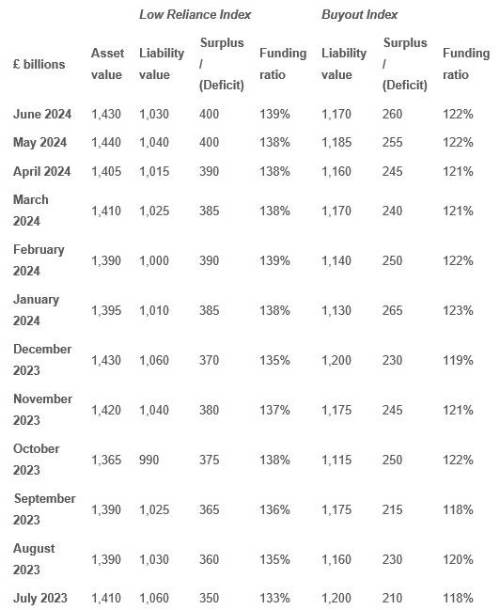PwC’s Buyout Index also shows that, on average, schemes continue to have sufficient assets to ‘buyout’ their pension promises with insurance companies, recording a surplus of £260bn in June.
In light of their sustained surpluses, sponsors and trustees now have an opportunity to make sure that they reap the benefits of advancements affecting the pensions industry, including Artificial Intelligence (“AI”) and Generative AI.
John Dunn, head of pensions funding and transformation at PwC UK, said: “With funding levels of the UK’s DB schemes remaining stable and strong, sponsors and trustees need to focus on forward planning and efficient running of their pension schemes. Technology has already played a critical role in the last few years to increase real time information and help schemes make decisions more quickly. But another wave of change is coming. AI is increasingly a part of our daily lives - from automation to augmentation and beyond.
“The key question for sponsors and trustees is - how can they harness AI’s power to benefit their pension schemes? Our research shows that, by 2030, AI will provide $15.7 trillion of global economic growth. Those pension schemes, both in the private and public sector, that take the lead now will ensure a share of this growth can benefit their members.”
Gavin Sharma, head of pensions technology and AI at PwC UK, added: “It’s clear that many people believe an AI related change is on the horizon. During our most recent pensions Virtual Ideas Exchange event, over 70% of respondents said they expect AI to substantially impact the pensions industry within the next five years.
“A recent PwC survey found that sectors with highest AI penetration are seeing almost fivefold (4.8x) greater labour productivity growth. We’re already seeing AI being used in pension schemes to increase operational efficiency - from automating data processes to drafting scheme documentation. And in the near future we can also expect to see AI being used to personalise the member experience and to bring insights that enhance decision making.
“It can be easy to get swept up in the excitement of AI opportunities, and being aware of potential risks and having the right governance processes in place are key - particularly given the large amount of sensitive data held by pension schemes. With most organisations being relatively early on in their AI journey, there is a lot for sponsors and trustees to consider - but the rewards on offer once they have harnessed its opportunities are likely to be considerable.”
The PwC Low Reliance Index and PwC Buyout Index figures are as follows:

|

